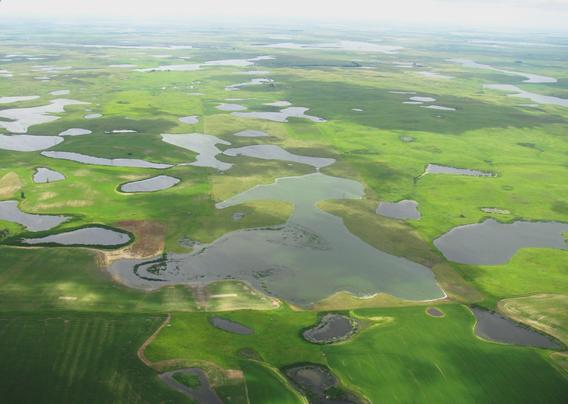
Climate driven increases in magnitude and frequency of extreme precipitation events exacerbate the stress of changing agriculture production in the Upper Mississippi River Basin, impacting aquatic ecosystems and impairing water quality.
Challenge: Changes in wetland connectivity impact ecosystems and people, including waterfowl habitat, flood management, and reduction of nutrients into local watersheds.
Principal Investigator(s):
- Owen McKenna (U.S. Geological Survey, Northern Prairie Wildlife Research Center)
Co-Investigator(s):
- Rebecca Kreiling (U.S. Geological Survey, Upper Midwest Environmental Sciences Center)
- Max Post van der Burg (U.S. Geological Survey, Northern Prairie Wildlife Research Center)
- Josh Eash (U.S. Fish and Wildlife Service)
Cooperator/Partner(s):
- Joseph Knight (University of Minnesota)
- Audrey Lothspeich (University of Minnesota)
- Sara Vacek (U.S. Fish and Wildlife Service)
- Melanie K Vanderhoof (Geosciences and Environmental Change Science Center)
- Heather Golden (US Environmental Protection Agency (EPA))
- Charles R Lane (U.S. Environmental Protection Agency)
Wetland conservation in the Upper Mississippi River Basin (UMRB) is a priority for Federal, State, NGO, and Tribal land managers to support migratory bird habitat in Minnesota and Iowa. These wetlands, known as depressional wetlands, also provide ecosystem services associated with flood water storage and enhancing down-stream water quality by storing and processing nutrients. Understanding how conservation efforts and management strategies can impact both wildlife habitat and water quality/quantity issues in the UMRB is critical for helping this region adapt to future precipitation patterns.
High intensity rainfall events can cause depressional wetlands to overflow and connect with Mississippi River tributaries. This reduces the wetlands’ abilities to process nutrients and mitigate nutrient pollution in the Mississippi river. These overflow events are expected to increase due to climate change, as extreme precipitation events become more common and more severe. Management agencies need more comprehensive decision support tools for assessing the capacity for depressional wetlands to store flood water and process nutrients under future climate projections.
The goals of this project are to quantify the impact of wetlands on reducing nutrient inputs to the Minnesota River and to estimate the impacts that increased precipitation and wetland drainage have on wetland ecosystems. The researchers from this project will work with managers at a collaborative workshop to present modeling capabilities and to co-produce effective, interactive tools to assist managers in planning for conservation actions that can be taken to mitigate impacts of future climate change both on migratory bird habitat and water quality.
Read more from the CASC Project Explorer.
